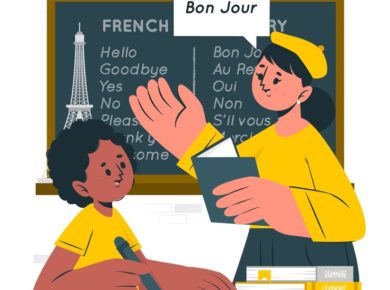Students should be taught stress management techniques early on in their education. Stress can cause many problems, including poor academic performance, anxiety, depression, eating disorders, substance abuse, and even suicide. Students need to understand what causes them to feel stressed out and how to manage those feelings. Teachers can also encourage students to seek help when they feel overwhelmed by studying. They Should be helped with handling the pressure of studies.

Here are some tips for teachers to help students with handling the pressure of studies:
Teach Students About Stress And How To Deal With It
Helping students identify when they are stressed and teaching them ways to cope with stress will help them handle situations better. Every student needs someone they can turn to if they feel like they are not coping well.
Develop A Positive Relationship
A teacher should provide a safe environment where students feel comfortable sharing their feelings and needs. Teachers should also be available to help students cope with issues like bullying, depression, anxiety, and other mental health problems.
A Classroom Culture Of “All For One, And One-For-All”
Students benefit because they feel like they belong, and teachers benefit because students will be more engaged and willing to participate in class discussions. Social connections help build relationships. When students feel socially connected in a positive environment, they tend to experience less stress and anxiety. Oxytocin levels increase, and cortisol decreases.
Provide Flexibility
When people are organized, they feel more confident and relaxed. Students should be allowed to have flexible due dates for assignments. This will help them stay focused and motivated while also keeping them organized.
Lessons Shouldn’t Just Prepare Students For Tests.
They should also push them to think about concepts in ways that will allow them to apply those concepts to real-life situations. Students need to understand the material at a deeper level. Project-based learning helps achieve this goal. Projects force students to apply what they’ve already learned, and they often require students to solve problems that aren’t necessarily covered in class. These projects give students practice solving problems and thinking critically while providing teachers with valuable feedback on how well their students are grasping the concepts.
Create A Mental Suitcase
Judy Willis, a neurologist, recommends that students can reduce stress and increase their memories by taking a piece of paper and writing the important items, formulas, procedures, vocabulary, etc. As a review. Doing this before taking the test will help them “increase their retrieval efficiency when they’re not trying to hold that information in working memory during the test.” So, having a mental suitcase helps in handling pressure of studies easily.
Be Aware Of The Stressors
Stress is a natural response to any situation that causes anxiety. When our brains are stressed, they become less efficient at processing information. Teachers should be aware of the stressors their students face outside of school. If a student is struggling academically, teachers should consider whether there might be an underlying cause that needs attention. Stressful events can affect learning, so teachers should also pay close attention to the mental health of their students. Understanding how stress affects learning will allow them to create environments that promote optimal learning.
Conduct Morning Meetings
Morning meetings should be a regular occurrence during the school day. Students need to feel like they are heard and valued. These conversations will help you understand what is going well and what needs improvement. You can also discuss any concerns or problems that students might be experiencing. By addressing them early, you can prevent them from becoming bigger problems later on.
Games As Stress Busters
Using games are an engaging way to teach kids about emotions and stress management. Games can also help kids deal with stress in real-life situations. Some examples of these games are:
- Stress management escape room: Students engage in hands-on, interactive puzzles that explain how to manage stress by engaging in physical activity, practicing mindfulness, getting organized, relying on social support, and other coping skills.
- Stress bingo: This free game teaches kids how to manage stress by using humor, relaxation techniques, and problem-solving strategies.
- Coloring, jigsaw puzzles, and word scapes: Research shows that coloring, jigsaw puzzles, word scapes, and other activities can help kids calm down and relax. You may also want to dedicate time during the day to allow all students a chance to engage in one of these calming activities, or you could create a quiet area where students can go to focus on a puzzle, color, etc., during times when they feel particularly stressed.
Practice Mindfulness
Mindfulness is a way to become aware of our own thoughts, feelings, and physical sensations. We can use this knowledge to identify when we are about to react negatively to something and then stop ourselves before we act. This helps us stay calmer and more focused. This framework helps students recognize triggers and changes in their bodies, which can help them manage stress and anxiety before acting negatively towards themselves or others.
Breathing Exercises
Deep breathing exercises can help students relax and feel calmer. Research shows that deep breathing affects the heart, brain, digestive system, and immune system, and it can have immediate effects. Deep breathing techniques can also reduce the production of harmful cortisol, the hormone associated with stress. Students should practice deep breathing techniques regularly to reduce stress and stay focused during class.
Have An Open Line Of Communication
Students should feel comfortable talking to you about their problems. You can help them by encouraging them to reach out to you if they need anything. Keep your lines of communication open, whether it’s via email, online chat, virtual meetings, or phone calls.
Final Thoughts
We hope these stress management tips are useful as you teach students about managing stress and helping them learn strategies that work best for them!
If you have a passion for teaching and want to expand your online coaching business, then Classplus is here to help you. Get your own personalized app and reach out to a larger number of students across the country. To know more, connect with us and talk to our experts now!




